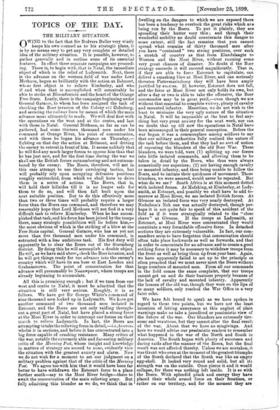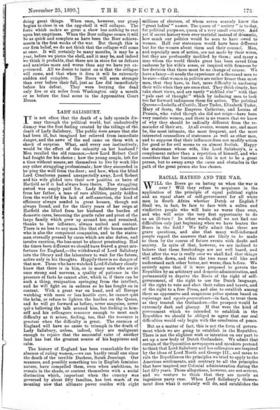TOPICS OF THE DAY.
THE MILITARY SITUATION.
0" to the fact that Sir Redvers Buller very wisely keeps his own counsel as to his strategic plans, it is by no means easy to get any very complete or detailed idea of the military situation. It is possible, however, to gather generally and in outline some of its essential features. In effect three separate campaigns are proceed- ing. There is, to begin with, that in Natal, the immediate object of which is the relief of Ladysmith. Next, there is the advance on the western field of war under Lord Methuen, begun so brilliantly with the action at Belmont, whose first object is to relieve Kimberley, and who if and when that is accomplished will conceivably be able to strike at Bloemfontein and the heart of the Orange Free State. Lastly, there is the campaign beginning under General Gatacre, to whom has been assigned the task of checking the Boer invasion of the Colony viZ Oolesberg, and securing the railway lines by means of which tbe main advance must ultimately be made. We will deal first with the operations on the west and at the centre, and last with those in Natal. General Methuen, as far as can be gathered, had some thirteen thousand men under his command at Orange River, his point of concentration, and with these he began his advance on Thursday,— fighting on that day the action at Belmont, and driving the enemy to retreat in front of him. It seems unlikely that he will find any much larger forces to oppose him than that he has just met, and for the first time during the war we shall see the British forces outnumbering and not outnum- bered by the enemy. The Boers, therefore, will not in this case attempt to use their enveloping tactics, but will probably rely upon occupying defensive positions roughly entrenched, from which we shall have to drive them in a series of actions. The Boers, that is, will hold their hillsides till it is no longer safe for them to do so, and will then fall back upon the next suitable position. But to do this effectively more than two or three times will probably require a larger force than the Boers can command, and therefore we may reasonably hope that Lad Methuen will not find it a very difficult task to relieve Kimberley. When he has accom- plished that task, and his force has been joined by the troops there, many strategic possibilities will lie before him,— the most obvious of which is the striking of a blow at the Free State capital. General Gatacre, who has as yet not more than five thousand men under his command, is entrusted with a less ambitious task. His first duty will apparently be to clear the Boers out of the Stormberg district. By doing this he will accomplish a double object. He will, as we have said above, check the Boer invasion, and he will get things ready for the advance into the enemy's country which will have its sea base at East London and Grahamstown. The point of concentration for that advance will presumably be Naauwpoort, where troops are already beginning to accumulate.
All this is promising enough ; but if we turn from our west and centre to Natal, it must be admitted that the situation is still very serious. Roughly, it is as follows. We have got Sir George White's command of nine thousand men locked up in Ladysmith. We hive got another command of two thousand men isolated in Estcourt, and the Boers are not only raiding through- out a great part of Natal, but have placed a strong force at the Mooi River in order to intercept our forces on their march to relieve Ladysmith. In fact, the Boers are attempting to take the relieving force in detail,--i.e., to over. whelm it in sections, and before it has concentrated into a big force capable of crushing resistance. Many critics of the war, notably the extremely able and far-seeing military critic of the Morning Post, whose insight and knowledge in matters of strategy are second to none, evidently view the situation with the greatest anxiety and alarm. Now we do not wish for a moment to set our judgment on a military problem against that of the critic of the Morning Post. We agree too with him that it would have been far better to have withdrawn the Estcourt force to a place further south—say to the Mooi River bridge—there to await the concentration of the main relieving army. But fuk admitting this blunder as we do, we think that in dwelling on the dangers to which we are exposed there has been a tendency to overlook the great risks which are being run by the Boers. To put it plainly, they are spreading their butter very thin ; and though their wonderful mobility no doubt counteracts this danger to some extent, still the fact remains that you cannot spread what remains of thirty thousand men after you have "contained" two strong positions, over such a stretch of country as that from Elandslaagte to Weenen and the Mooi River, without running some very great chances of disaster. No doubt if the Boer strategy succeeds it will succeed magnificently. That is, if they are able to force Estcourt to capitulate, can deliver a smashing blow at Mooi River, and can seriously threaten Pietermaritzburg they will have been amply justified by SUCC3SS. If, however, Eitcourt does not fall, and the force at Mooi River not only holds its own but after a day or two is able to take the offensive, the Boer commandos may be in great peril,—even though we are without that essential to complete victory, plenty of cavalry and mounted infantry. Meantime, we do not wish in the least to minimise the very ugly nature of the situation in Natal. It will be impossible at the best to feel any- thing but very great anxiety for the next week, nor can we doubt that up till now the operations in Natal have been mismanaged in their general conception. Before the war began it was a commonplace among soldiers to say that our military authorities fully realised the nature Of the task before them, and that they had no sort of notion of repeating the blunders of the old Boer War. These blunders, we were told, were (1) splitting up our forces into little isolated commando, and allowing them to be taken in detail by the Boers, who thus were always numerically our superiors ; (2) not having enough cavalry or mounted infantry, and thus being unable to follow the Boers, and to imitate their quickness of movement. These blunders, we were assured, would never be repeated. But what do we see ? South Africa is at this moment dotted with isolated forces. At Mafeking, at Kimberley, at Lady- smith, at Estcourt, and possibly we shall have to add to- morrow at Mooi River, we see isolated British forces. At G-lencoe an isolated force was very nearly destroyed. At Nicholson's Nek one was actually destroyed, though per- haps it is not quite fair to speak of this accident of the field as if it were strategically related to the "close shave" at Glencoe. If the troops at Ladysmith, at Estcourt, at Mooi River were concentrated they would constitute a very formidable offensive force. In detached sections they are extremely vulnerable. In fact, our com- manders seem to have forgotten that concentration should often take place backwards as well as forwards, and that in order to concentrate for an advance and to create a good striking force it may be necessary to withdraw troops from the front as well as bring them up from your base.. Again, we have apparently failed to act up to the principle so often preached that we must never meet the Boers without large numbers of mounted men. From all our commands in the field comes the same complaint, that our troops cannot get on and do their business properly because of the lack of cavalry and mounted infantry. Apparently the lessons of the old war, though they were on the lips of so many soldiers, only reached the War Office in a very faint echo.
We have felt bound to speak as we have spoken in regard to these two points, but we have not the least intention of letting annoyance at this neglect of plain warnings make us take a Jaundiced or pessimistic view of the future of the war. Our blunders are extremely tire- some and vexatious, but they cannot alter the final result of the war. About that we have no misgivings. And here we would advise our pessimistic readers to remember what happened in the war of the North and South in America. The South began with plenty of successes and daring raids after the manner of the Boers, but the final result was not affected thereby. Unless we are mistaken, it was Grant who even at the moment of the greatest triumphs of the South declared that the South was like an empty egg-shell. It looked very round and solid, but all its strength was on the outside. Once pierce it and it would collapse, for there was nothing left inside. It is so with the Boers. With splendid pluck and energy they have placed their whole armed force on their frontiers, or rather on our territory, and for the moment they are doing great things. When once, however, our grasp begins to close in on the egg-shell it will collapse. The force which makes so great a show has nothing to rest upon but emptiness. When the Boer collapse comes it will be as quick and eomplete as have been the Boer achieve- ments -in the first weeks of the war. But though this is our firm belief, we do not think that the collapse will come at once. It will certainly be many months it may be a, year, before we pierce the shell, and it may be, and indeed we think it probable, that there are in store for us defeats and anxieties more and worse than any we have yet ex- perienced. All we desire to insist on is that the collapse will come, and that when it does it will be extremely sudden and complete. The Boers will seem stronger than ever before their fall, just as Lee did immediately before his defeat. They were burying the dead only five or six miles from Washington only a month or so before the final scene in the Appomattox Court House.











































 Previous page
Previous page